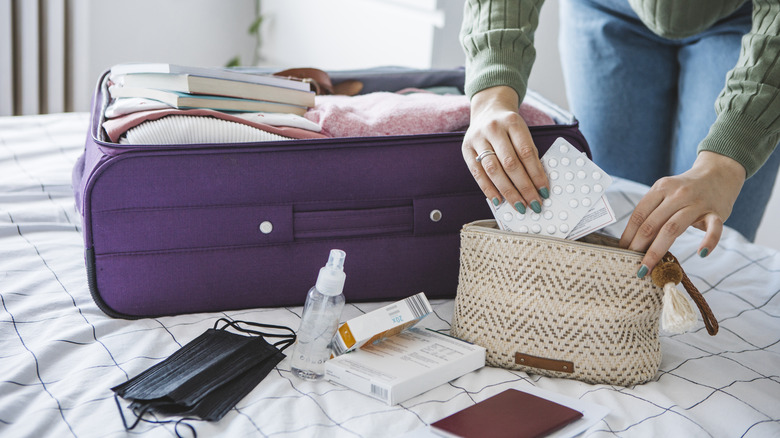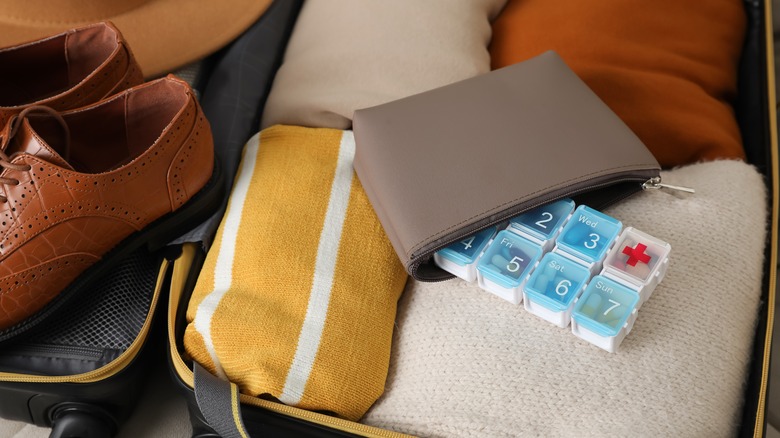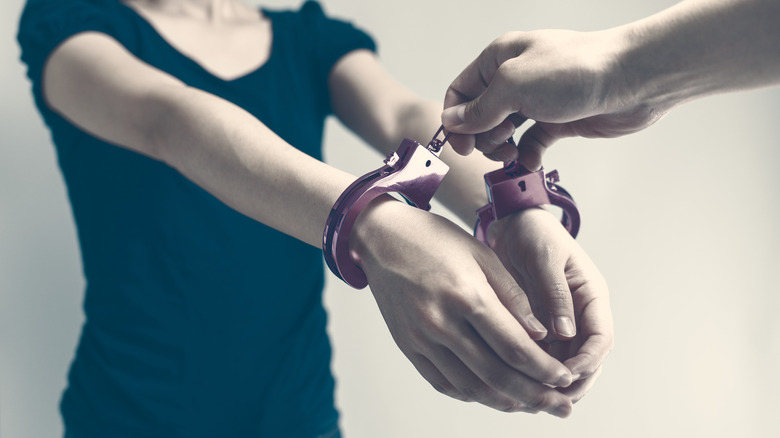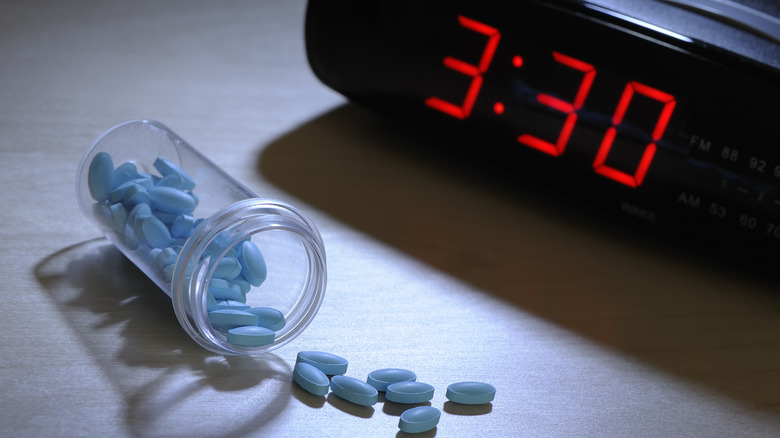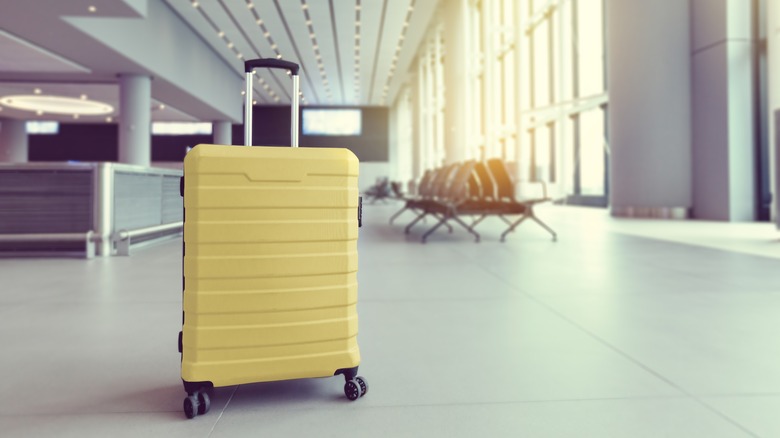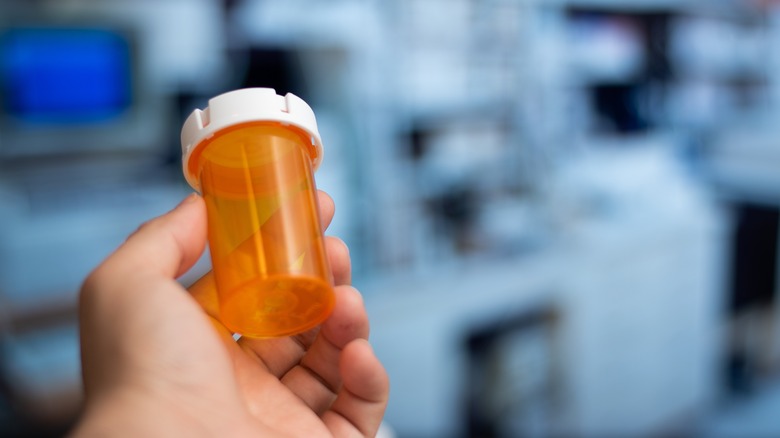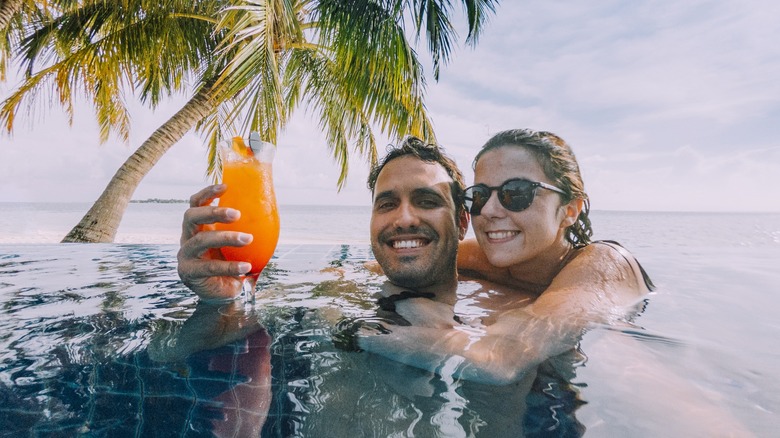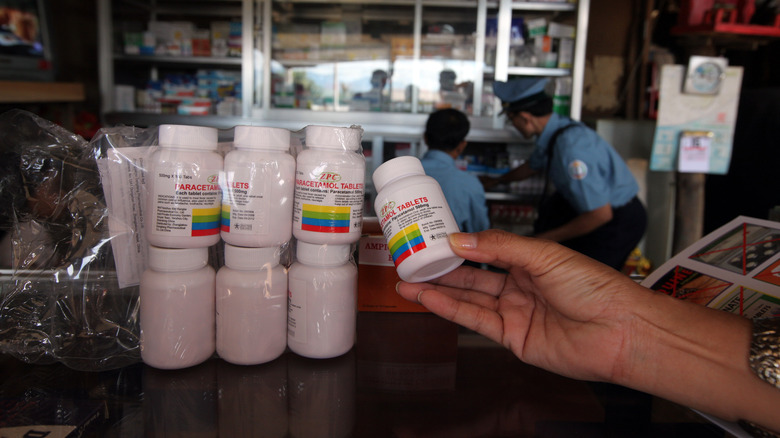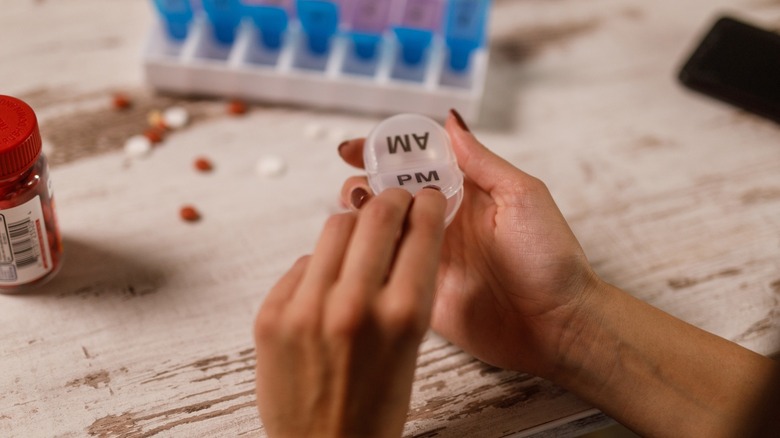Medication Mistakes To Avoid When Traveling
For travelers who require a daily medication schedule, life on the road can be tricky. Heading from one destination to the next and disrupting your daily schedule — even with adventure — can make keeping up with medications pretty challenging. But with a little careful planning and the presence of mind to avoid certain pitfalls, there's no reason why most folks shouldn't be able to enjoy their vacation without any major disruptions in their medication schedule.
Depending on whether you're traveling by air, by land, or by sea, making sure everything goes smoothly can look a little different. What's important is to make sure you've got all of your ducks in a row before you go, whether that means sharing your travel plans with your doctor or checking with your travel agent to make sure you know what to expect when you arrive. Because good health goes hand-in-hand with a good time, here are some common medications to avoid on your next trip, along with suggestions for how to avoid them.
Leaving your meds in the heat
Speaking to Today, the American Pharmacists Association VP of Pharmacy Practice and Professional Affairs advised that not all medications should be stored at the same temperature and that exposing medications to extreme temperatures can cause them to become less effective. It's something Redditor u/EuphJoenium found out after leaving a full bottle of Adderall XR in a hot vehicle right after refilling their medications. The unwitting Reddit user brought it inside the following day, but when it was finally time to take their first dose from the fresh bottle, they quickly realized it didn't seem to be working, and a doctor confirmed that heat could indeed make medication significantly less effective. And it's not just ADHD meds. According to Baylor College of Medicine, hypothyroidism medications and over-the-counter painkiller medications are also heat-sensitive.
If the thought of getting stuck on vacation with ineffective medications sounds miserable, be sure to check the fine print on your medication insert or look this information up online to find out if your meds are affected by extreme temperatures. When planning to spend the day in the heat, only take the medications you'll need with you and leave the rest in your hotel room or cruise ship security box. If you absolutely can't avoid it, store your medications inside something more temperature-controlled. If you are traveling by car, never leave your meds in your vehicle — take them with you inside your hotel, and anywhere else you happen to be going.
Leaving your meds in your checked luggage
There are plenty of reasons someone might prefer to check their medications. Maybe they don't want to risk getting hassled by TSA, or perhaps they just want to hang onto as much space as they can in their carry-on bag. Either way, there's simply no getting around the fact that anything you pack in your checked baggage runs the risk of not making it to your destination with you — and that's something you shouldn't risk with prescribed medications.
It's a horror story recounted many times on Reddit. Desperately posting on a subreddit dedicated to all things Norway, u/COmarmot explained that they had checked several essential medications, including an anti-anxiety drug, anti-seizure drug, and antidepressant. Upon arriving in Norway, they learned that Iceland Air had lost their luggage. Fortunately, Norwegian health care is pretty fantastic, and the system set them up with most of what they needed. But not everyone who loses their medication is so fortunate.
To prevent others from going through what this user experienced, TSA's official website advises, "It's highly recommended you place these items in your carry-on in the event that you need immediate access." If the amount of liquid medications you need to bring with you puts you over the 3.4-ounce limit, TSA says they can likely accommodate you — just be sure to speak with the security officer before heading through the checkpoint.
Taking them to a place where they aren't legal
Unfortunately, just because a medication is legal in the United States doesn't mean it will be allowed in the country you're visiting. Even worse, it could actually land you in prison since most nations adhere to the legal principle "ignorantia legis neminem excusat," a Latin phrase meaning "Ignorance of the law is no excuse." This principle was put on display globally when WNBA star Brittney Griner was sentenced to nine years in prison for allegedly bringing cannabis oil into Russia in 2022. Although she would eventually be released in a prisoner exchange, Griner spent ten grueling months in the country before her release was arranged.
Just like the United States, every country has its own rules on what is and is not legal, and being a U.S. citizen with a legal prescription won't help you. Japan, for example, has some pretty strict prohibitions on several medications that are commonplace in the United States. Stimulant-containing ADHD meds are a hard no, and there are incredibly strict limits on many common over-the-counter stimulant-containing medications (think Sudafed and Vicks inhalers, for example).
To avoid running afoul of the law anytime you're traveling outside the United States, do your research before you go and make sure your medications are allowed in your destination country. If a medication you need isn't legal where you're headed, be sure to speak with your doctor about switching to an alternative while you're traveling abroad.
Forgetting to factor in time zone changes
A traveler takes a 12-hour medication at 4 p.m. in Central Standard Time before flying a redeye to Dublin — it might sound like a middle school math problem, but these are the kinds of things you don't want to end up working out when you're already dealing with jet lag. Failure to plan ahead for time zone changes can lead to gaps in your medication maintenance or even an accidental overdose. Even if you're not going far, it can be easy to make a time zone-related medication error.
To keep track of everything, wear a watch with your original time zone to stay lined up with your last dose. Alternatively, consider downloading a clock app that tracks multiple time zones. If you take your medications every few hours, you can also set alarms on your phone every time your meds are due before leaving for your trip. And write your dose times down.
If you're on a medication you take at the same time daily, particularly something like diabetes maintenance medications that need to line up with your sugar intake, things can get really tricky. Even if your pharmacist suggests taking the same dose at the same time as you normally would, traveling abroad could either have you taking those meds in the middle of the night or leaving a gap in your first dose overseas. For these situations, it's best to make a plan with your doctor or pharmacist before leaving.
Forgetting to take your meds altogether
Vacations are all about letting go of responsibilities, even if it's just for a little while. With all the fun you end up having while traveling, it isn't hard to see how someone could get caught up in the spirit of the hour and accidentally miss a dose. While for some medications, a slight change in dosage schedule can be relatively insignificant, for many medications, this can be problematic. This can really become a problem once these missed doses start to add up, with patients taking less frequent doses than prescribed or skipping multiple days of treatment.
If you realize you've missed a dose, call your home pharmacy or doctor to find out what to do since the instructions on how to handle a missed dose can vary from one medication to the next. To make sure you stay on track with your medication schedule, consider keeping a medication diary or logbook during your trip. Better yet, use your phone's alarm app to stay on top of your med schedule while traveling.
Accidentally leaving your meds behind somewhere
Travel enough times, and you'll eventually find that you've arrived at your destination without something you meant to pack but overlooked in all the pre-vacay excitement. While it's easy enough to replace a toothbrush or grab a pack of socks when your luggage is lost, leaving your medications behind can leave you in a world of hurt. That's what happened to one poor soul who posted their experience on Reddit. Posting on r/vancouver, the user wrote, "Sorry if this is the wrong place to post but I'm freaking out and super desperate. I'm on vacation in Whistler, BC, and I forgot my antidepressants." Unfortunately for the poster, their medication caused significant withdrawal symptoms when suddenly discontinued. Another poster told Quora how they accidentally left their controlled medications behind in their hotel room only to find their meds missing by the time the unlucky traveler called the hotel.
To avoid leaving your medications behind, whether you're heading from home or a hotel room, follow a checklist, making sure your medications are there just before you leave. While you're traveling, keep any controlled medications locked away in a secure suitcase or hotel room safe so that if you do leave them behind, they can't be easily nabbed by anyone who comes across them.
Not bringing enough medication along for an unexpected travel delay
It makes sense that you might want to plan your medications out exactly when traveling, taking only exactly what you need for your journey. But doing so assumes that nothing goes wrong, a premise Murphy's Law tends to disprove at the worst possible times. As anyone unfortunate enough to be traveling when the pandemic first hit can attest to, you really never know when the unexpected can leave you stranded somewhere you didn't plan to be, whether due to a delayed flight or some other disaster. That's why it's important to always bring more medication than you'll need for your trip when you travel.
Just ask Karen Lanzetta, the voice behind Our Carpe Diem, a blog dedicated to her experiences as a frequent traveler with multiple sclerosis. Recounting a medication close-call she averted with good planning, Lanzetta wrote, "[W]hen we came back from that Hawai'i trip, there was a snow storm on the East Coast and we got stuck in San Francisco for four days. Luckily, I had packed an extra week of my Copaxone shots." If you're unable to bring much extra medication with you due to a refill date falling close to your trip, discuss this with your doctor ahead of time so you can have a plan in place if you end up stranded someplace.
Skipping doses on purpose
If you're one of those folks who doesn't ordinarily drink alcohol, stays away from fatty foods, or experiences a drowsy side effect from a medication, the temptation to skip a few doses while on vacation is understandable. And you're certainly not alone — plenty of posts on Reddit feature users contemplating the worst thing that could happen if they take a drug holiday to enhance their actual vacation. While there are a few medications that doctors recommend taking a break from meds occasionally, it's never wise to skip medications on purpose without your doctor's approval.
There are plenty of reasons you should avoid skipping doses on purpose. Antibiotics can flat-out fail to do their job if you miss doses. Certain pain medications work better when taken ahead of your pain, and waiting too long could literally put a cramp in your style. There are many medications that can leave patients dealing with serious withdrawal symptoms, often in a shorter time frame than you might expect. And that's to say nothing of the potential health problems that could arise from missing or delaying a dose of some cardiopulmonary medications. If you are thinking of skipping a dose while on vacation, talk to your doctor about the risks and benefits. It may even be possible to help you address your side effects in another way while you're on vacation.
Purchasing counterfeit or poorly-regulated meds while abroad
It's becoming increasingly common for Americans to pick up medications while they're traveling outside of the United States to save money or obtain medications that might be difficult to get with their insurance. In some cases, the medication is the destination. U.S.-based news sources have been reporting on the trend for years, with an emphasis on U.S. citizens traveling to Mexico for everything from insulin to blood pressure medications.
However, the CDC warns that purchasing medications in low-income and middle-income countries can come with a sizable risk, with buyers running the risk of picking up both counterfeit and substandard quality medications. According to the organization, "Even high-income countries are not immune to the problem, because counterfeiters become adept at thwarting the efforts of more advanced regulatory systems." And things can even turn deadly. In 2023, a young Oregon man named Tristin Schiess even lost his life to counterfeit medications purchased at a local pharmacy when he purchased pain medication from a local pharmacy while on a family cruise to Mexico.
If you need to purchase medications while overseas, the CDC advises checking with the local embassy for a list of legitimate pharmacies and avoiding street vendors altogether. Check to make sure all medications are still in their original packaging, watching for alterations or defects in the print on packaging or pills. And if the price sounds too good to be true, it probably is.
Not keeping something to eat handy when taking certain meds
Keeping up with your meds while you're on vacation can throw off your medication schedule, particularly if you've got a prescription that needs to be taken with food. Even if you plan your meals around your medications, airport delays and city traffic can easily throw a wrench in your plans.
If your medication's label comes with an instruction to take with food or water, there's probably a good reason for it. Some types of medications, like ibuprofen, can interfere with the stomach lining's ability to resist acid, leading to issues like bleeding, ulcers, or inflammation. Taking food with these medicines can help to reduce these problems by coating the stomach.
If your medication needs to be taken with food, try keeping a few snacks and a water bottle in your backpack so you don't end up needing to take your medication on an empty stomach. Granola bars, cashews, and dried fruit are a few examples of foods that travel and keep well when you're on the go.
Getting too much sun on certain meds
Before you spend a day catching some rays, check to see if any of your medications can increase the effects of the sun, resulting in serious sunburn, or impact your body's ability to regulate heat. Speaking to KVUE ABC, Harbor Health Clinical Pharmacy Program Director Dr. Jodie Pepin advised that several medications can interfere with the body's ability to keep cool. Included among them are decongestants, beta-blockers, and even a few ADHD medications.
According to Pepin, that's because these medications interfere with the way blood flows to the skin and a few other mechanisms that, in turn, can impact the body's cooling-off process. Pepin added, "So when it's really high like that, you get heat trapped inside of you and it can be really dangerous for temperatures going up, and it can have bad sequelae from this." She went on to warn that some medications, like diabetes meds and laxatives, can cause individuals to become dehydrated more easily — something that can be a real problem in the summer heat. Finally, there are quite a few medications that can increase individuals' photosensitivity, including antihistamines, many NSAIDS, vitamin B6, and St. John's Wort. If your meds do come with one of these side effects, just be sure to plan accordingly, loading up on a high-SPF sunscreen and hat to protect yourself from the sun, plenty of hydration tools, and a travel fan to help keep you cool.
Avoid getting flagged by TSA or running into issues with law enforcement
Officially, TSA doesn't care if you've got your meds in their original package. According to the official TSA website, "TSA does not require passengers to have medications in prescription bottles, but states have individual laws regarding the labeling of prescription medication with which passengers need to comply." Nonetheless, it's a good idea to have your prescription bottles with you since you just don't want to run into issues while traveling. And generally speaking, people bring their meds through airport security in all sorts of things — even "weird little baggie pill storage," as one Reddit user put it. But it's always best to speak with TSA before going through security so you don't run into any surprises that end up getting you flagged by TSA.
Outside of the airport, you never know when you could run into issues when you're traveling, and the last thing you need is to find yourself in hot water because of a questionably stored medication — particularly a controlled substance. This is even more of a concern when you plan to be traveling by car through states you don't live in since local police in some areas can get pretty strict about unmarked medications. To avoid running into these issues, keep your original prescription bottles with you at all times. Better yet, add a pharmacy printout of your prescribed medications in case you run into trouble on the road.
